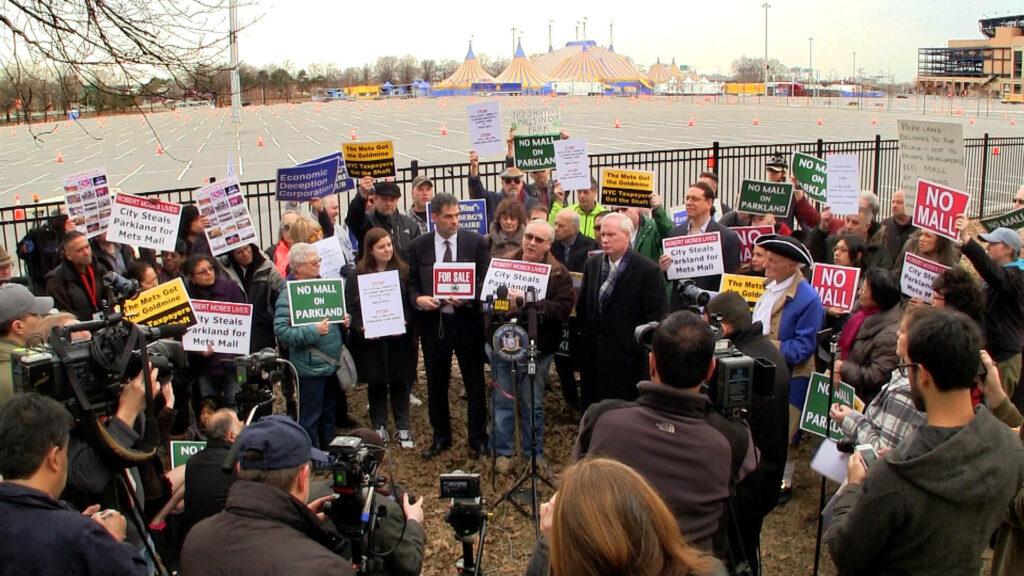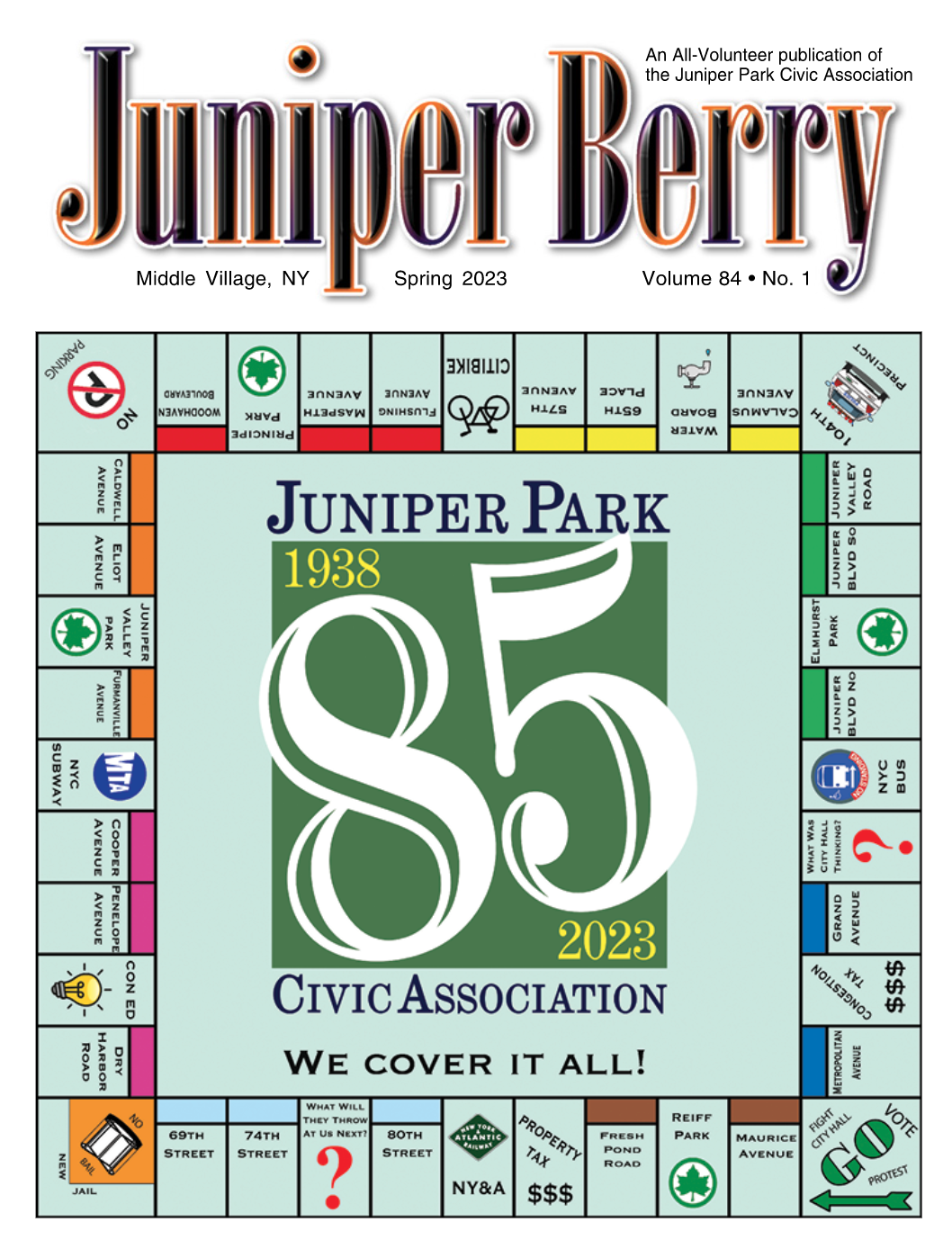LEADERS DECRY STEVE COHEN’S INITIATIVE TO CONSTRUCT CASINO OR OTHER COMMERCIAL STRUCTURES IN FLUSHING MEADOWS CORONA PARK
Prominent civic leaders have organized to oppose the construction of a casino or other commercial structures on the public parkland surrounding Citi Field stadium. Their announcement of opposition comes days before Mets owner Steve Cohen will hold a “visioning session” to advance his desired development scenarios for that parkland. It also comes one year after numerous Queens civic groups first notified the NYS Gaming Commission of strong objections to siting a casino in the vicinity of Citi Field stadium, including on the public parkland.
Although Cohen’s visioning session will be held just as the Gaming Facilities Location Board is accepting applications for three downstate casino licenses, and although Cohen reportedly intends to submit an application to construct a casino on parkland surrounding Citi Field, Cohen’s press release for his upcoming visioning session conspicuously lacks any specific mention of building a casino on the parkland – instead vaguely referring to an “entertainment” venue on “50 acres of vacant asphalt.”
“We believe that Steve Cohen is trying to create a perception of public support for a vague concept of an ‘entertainment venue’ – but that he may later misrepresent that as support for a casino to be built on the parkland,” said Jena Lanzetta, a Bayside community activist. “He’s soliciting public opinion, without disclosing that his plans impact public parkland, or that his true ambition is a casino. We will expose such deceptions every step of the way.”
The civic leaders are especially outraged by Cohen characterizing the land at issue not as public parkland, but merely as “50 acres of vacant asphalt.” The 50 acres in question – the former site of Shea Stadium – are not only leased for parking operations at Citi Field, but also host numerous events, including carnivals and fairs, para-athletic sports matches and a variety of other public uses. (see photo above)
“The land surrounding Citi Field is public parkland, part of Flushing Meadows-Corona Park,” said Richard Hellenbrecht, a founder and officer of Flushing Meadows-Corona Park Conservancy. “Yes, it’s paved over and sometimes used as parking spaces for events at Citi Field. But the fact that it’s paved makes it perfectly suitable for the numerous concerts, circuses, festivals, marathons, and other popular public events that are held year-round on that very parkland. For Cohen to imply that ‘vacant asphalt’ is all it is, or that it is un-used as parkland, is deceptive and misleading – and plain wrong.”
A previous attempt by Queens Development Group to construct a 1.4 million square foot commercial shopping mall on the same parkland where Steve Cohen wants to build a casino was disallowed by a 2017 Court of Appeals decision. That court upheld a unanimous decision of the Appellate Division, that the parkland at issue could not be constructed upon for non-park use, because the legislature never explicitly authorized it. Included among the civic groups and individuals who presently oppose commercialization of the parkland are many who were plaintiffs or organizers of the prior lawsuit, including the Queens Civic Congress, urban planner Paul Graziano, Whitestone civic leader Alfredo Centola, and community activists Christina Wilkinson of Maspeth and Robert LoScalzo of Whitestone.
Queens Civic Congress President Warren Schreiber, said: “Our message to state legislators is: Our parkland is irreplaceable. It is not for sale. Contrary to what would-be casino owners may say, public parkland is not ‘developable property,’ and it must never be viewed as such. Why is Flushing Meadows-Corona Park – which this planned ‘entertainment center’ and casino has been proposed in – over decades consistently targeted by commercial schemes, when other parks throughout the city are not? Can you imagine a Manhattan developer holding a ‘visioning session’ to consider repurposing the portion of Central Park between 59th and 61st Streets? If it’s outrageous to do that in Manhattan, then it’s just as outrageous to do it in Queens.”
The civic leaders are not only concerned that Cohen’s plans will take away precious parkland. They also believe that a major year-round attraction built on land surrounding Citi Field will exacerbate traffic on major roadways that commuters already find intolerable; and that if a casino is built, its negative impacts include demonstrated social ills that will spill into surrounding communities and populations.
Willets Point, located east of Citi Field, is already approved to be developed – all 62 acres of it. The traffic impacts of that project alone will worsen conditions on most of the popular roadways in the vicinity of Citi Field – so much so, that one professional engineer testified to the City Planning Commission that ‘I have never seen this level of unmitigated impact, in the 40 years I’ve been practicing. This is an unprecedented overload of the local roadway system.’ Any additional year-round attraction constructed on land west of Citi Field will generate even more traffic – further congesting roadways such as the Van Wyck Expressway and the Whitestone Expressway.
Tony Nunziato, President of Juniper Park Civic Association, said: “Touting the economic benefit of a casino is like putting the proverbial ‘lipstick on a pig.’ In fact, casinos extract wealth from communities, and typically weaken nearby businesses. Casinos depend on problem gamblers for their revenue base and living close to a casino increases the chances of becoming a problem gambler.”
That affects families and communities, as well as individuals. Casinos lead to social ills including increased substance abuse, violent crime, auto theft and larceny, and bankruptcy. The latter three all increased by 10 percent in communities that allowed gambling, and 8 percent of crime in counties with casinos was attributable to their presence. The New York Times published an investigative report on December 26, 2022, plainly headlined, ‘Casinos Target a Vulnerable Clientele: Older Asian Gamblers.’ A Citi Field-area casino, then, will ‘target’ the ‘vulnerable’ Flushing population of ‘older Asian gamblers.’”
Paul Graziano, an urban planner who was also a plaintiff in the 2014 lawsuit that enjoined construction on the parkland, said: “From a planning perspective, the development of a casino on public parkland is just plain wrong. Back in the 1980s, former Borough President Donald Manes supported the construction of a Formula One Grand Prix raceway around Meadow Lake, with the intention of turning Flushing Meadows-Corona Park into the ‘Meadowlands’ of New York City. As a parks advocate stated at the time: ‘This is not just a racetrack in the park. Once you’ve said yes to this, how do you stop the next guy? How do you stop a race in Central Park?’ Four decades later, we now face yet another attempt to take away our parkland for a private entity’s monetary gain. The continued attempts to monetize, privatize and destroy this particular park must stop.”
The civic organizations and leaders that have organized to oppose commercialization of the parkland or construction of a casino anywhere in the Citi Field vicinity include:
• Queens Civic Congress, which represents the interests of 60+ civic groups throughout Queens
Individual civic organizations including:
• A Better College Point Civic Association
• Auburndale Improvement Association
• Bayside Hills Civic Association
• Bay Terrace Community Alliance
• Bellerose Commonwealth Civic Association
• Douglaston Civic Association
• Flushing Meadows-Corona Park Conservancy
• Holly Civic Association
• Juniper Park Civic Association
• Kissena Corridor Park Civic
• We Love Whitestone
And area residents and experts.
The civic organizations and leaders oppose construction of a casino anywhere in the Citi Field vicinity, whether on the parkland located west of Citi Field, or on Willets Point land located east of Citi Field (as the negative impacts upon key roadways and community populations would be the same, irrespective of which property is used).



